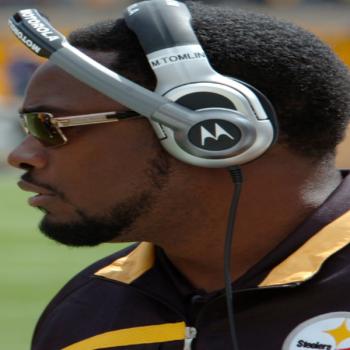
- High school locker room with basketball team players. The main player appears to be making a plea for victory with his head down and a basketball in his hands. Photo from iStockphoto.com. Photo taken by SDI Productions.
With college basketball tournaments underway, it’s common for teams and fans to make desperate pleas during the final seconds of a close game. But as an avid college basketball fan, should I plea for victory?
Charlotte Smith would say yes as she said a quick prayer before making the game-winning three-pointer in the 1994 Women’s NCAA Tournament Championship Game (pg.114-115 in Hoop Muses).
The 2016 North Carolina Tarheels may say no after losing the NCAA National Championship to Villanova at the buzzer.
This contrast in outcomes shows praying for a win may not always work out in one’s favor. The impact of prayer also comes into question as both teams have believers interceding on their behalf.
One side has to be the loser at the end of the game. Does this mean God loves the losing squad less? Does God even care about the final score of an athletic contest?
The best way to address these inquiries is by examining prayer from a biblical context.
What is Prayer?
Prayer Is?
According to scripture, prayer is an opportunity for humans to encounter the Lord by
- Sitting still and drawing close to him in secret (Matthew 6:6; James 4:8)
- Worshipping him (Psalm 92:1-5).
- Thanking him (Psalm 107:1).
- Receiving instruction and revelation (Genesis 12:1; Acts 22:10).
- Experiencing his peace and comfort (Psalm 34:18; Philippians 4:6-7).
- Confessing faults (Psalm 51:1-17).
- Receiving forgiveness (2 Chronicles 7:14; 1 John 1:9).
- Allowing the Holy Spirit to intercede for you (Romans 8:26-27).
- Receiving the boldness to be an effective witness (Acts 4:27).
These nine points are not all prayer encompasses. However, this list does highlight the significance and benefits of this discipline.
Prayer is Not?
Therefore, people should not treat prayer like a fire extinguisher only used to quench the flames of pending destruction. Also, prayer is not a way to treat God like a genie who exists to grant wishes.
Making petitions for selfish gain insults God. The reason why is God longs to have an authentic relationship with his creation (Psalm 145:18). However, when a petitioner prays selfishly, God’s hand rather than his heart becomes the source of their desire.
Does God Care About Sports-Related Prayers?
Those who know the heart of God understand they can plea for victory. Philippians 4:6 says to pray about everything instead of being anxious.
1 Peter 5:7 offers further encouragement when saying, “cast all your cares on him because cares for you” (New King James Verison). Since the Lord gifts people with physical ability and a passion for sports, believers should include athletic matters in their prayers.
Nations of Coaches (NOC) understands the necessity of prayer in sports as every March 1 is College Basketball Day of Prayer. The initiative allows the organization to pray for the needs and well-being of everyone who plays a part in college hoops.
NOC also has an initiative asking fans to intercede for at least one collegiate program daily throughout March. Consistent prayer for college basketball programs is crucial this time of year due to the pressure and stress of March Madness.
Intercession in the Heat of “Competition”
Moses & the Israelites vs. The Amalekites
Moses (with the assistance of Aaron and Hur) intercedes for Joshua and the Israelites by keeping the staff of God lifted to the Lord. This experience in Exodus 17:8-15 is significant because it shows victory is impossible without total dependency on God.
From a coaching standpoint, Moses teaches Joshua (and readers today) that success requires dependency on God and teammates. Without the assistance of Aaron and Hur, Moses would not have had the endurance to intercede for the Israelites in battle.
Consequently, Israel would lose and no one would learn the Lord is Jehovah Nissi (our Banner, Exodus 17:15).
Elijah vs. Baal
The Lord continues to reveal himself as God through the Prophet Elijah. Elijah confronts Ahab for leading the Israelites into idolatry and challenges Baal’s prophets to a fire challenge to prove Jehovah is the true and living God (1 Kings 18:18-22).
The challenge requires Elijah and the prophets of Baal to call on their respective deity to see which one will bring down fire on the bulls they prepared for a sacrifice. Baal’s prophets cry out fervently and cut themselves, but their god utters no response.
When Elijah cries out to the God of Israel, he sends fire on the burnt offering and the Israelites turn back to him (1 Kings 18:30-40).
Greater Than The Final Score
Why do they play?
A common theme in the battles mentioned above is both leaders fight in the name of the Lord. They compete against enemies to make his name known among pagan nations who refuse to acknowledge him as God.
Similarly, athletes should use sports as a platform to make their faith evident to others.
Many are careful to credit God publicly after he hears their plea for victory. While admirable, athletes who identify as Christian must conduct themselves like representatives of the faith at all times (Philippians 1:27; Colossians 3:23).
This includes those moments when one is
- Tempted to conform to locker room norms that don’t represent their faith.
- In an altercation with a coach, teammate, or opponent.
- Frustrated with a referee who keeps making questionable calls.
- Having a tough day and don’t feel like giving their best.
- Starting to embrace a losing mentality because the season isn’t going well.
The Focus of Sports-Related Prayers
The ultimate reason for athletic participation is to glorify God. Therefore, the prayers of all involved in sports should reflect this purpose.
The Fellowship of Christian Athletes (FCA) supports this argument when advising coaches and athletes to make heart transformation and surrendering to God the focus of their prayers. These petitions help believers die to vain ambitions that can make sports more about their accomplishments rather than God’s agenda.
Ashland University Head Coach Sue Ramsey prayed for God’s will to be done through her team when they lost the Division 2 National Championship Game in 2012.
God worked the painful loss out for their good in 2013 as the Ashland Eagles won their first National Championship.
Ramsey’ demonstrates a level of spiritual maturity that develops as people realize God’s plan is greater than a plea for victory. Ramsey’s request also shows individuals involved in sports also need to pray for endurance to overcome and learn from trials.
One of the most beautiful aspects of athletic intercession is fan involvement. Beyond cheering during games, fans can support teams by praying for their
- Academic success.
- Boldness to face challenges.
- Boldness to spread the Gospel.
- Conduct inside and outside of sports.
- Discipline
- Families.
- Financial prosperity and wisdom.
- Future career endeavors.
- Health and well-being.
- Humility in losses and wins.
- Team Unity.
- Willingness to surrender to God’s will.
- Work ethic.
Consistently praying in this fashion helps fans have a greater connection to their favorite teams that goes beyond winning. Petitions concerning these areas can also spiritually empower teams to do the work to make victory a reality on and off the court.













